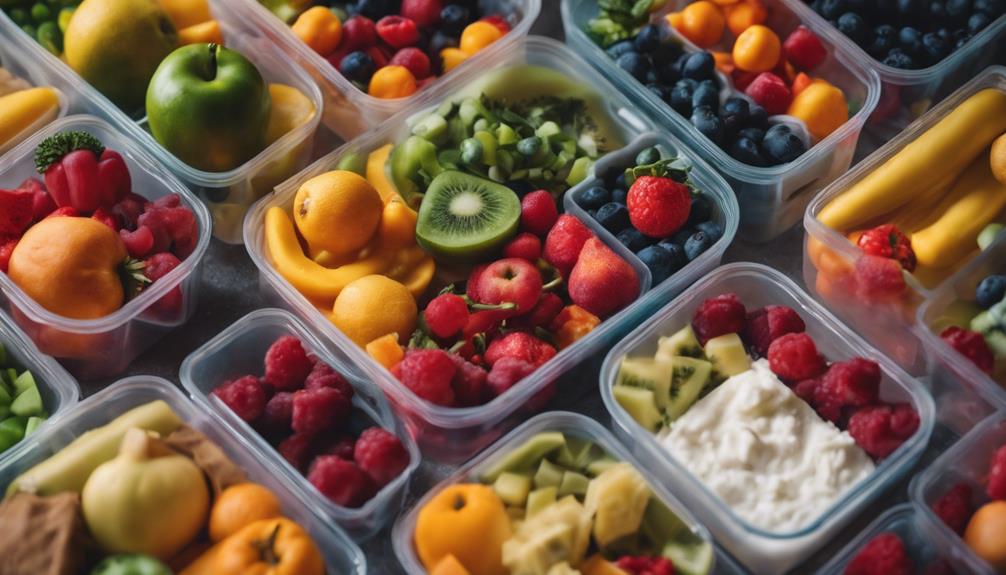Effective Strategies for Beating Sugar Addiction
Did you know that the average American consumes about 17 teaspoons of added sugar daily? That's a significant amount contributing to the widespread issue of sugar addiction.
But fear not, there are effective strategies at your disposal to help you break free from this cycle. By implementing simple yet powerful techniques, you can regain control over your cravings and make lasting changes for a healthier lifestyle.
Let's explore these strategies together and discover a path towards a sugar-free future.
Key Takeaways
- Understand sugar's impact on body and mind to address addiction effectively.
- Monitor sugar intake through journaling, portion control, and identifying triggers.
- Set goals, track progress, and celebrate victories to beat sugar addiction.
- Build a strong support system for empathy, motivation, and accountability in overcoming sugar addiction.
Understanding Sugar Addiction
To truly overcome sugar addiction, it's essential to first understand the powerful impact it has on your body and mind. Sugar cravings aren't just a matter of willpower; they're deeply rooted in the brain's dopamine response system. When you consume sugary foods, your brain releases dopamine, a neurotransmitter associated with pleasure and reward. This dopamine response reinforces the desire to consume more sugar, leading to a cycle of cravings and overconsumption.
Understanding this mechanism is crucial because it sheds light on why breaking free from sugar addiction can be so challenging. The more sugar you eat, the more your brain craves it to experience that pleasurable dopamine rush. This cycle can create a strong psychological dependence on sugar, making it difficult to resist cravings even when you know they aren't serving your health.
Assessing Your Sugar Intake
Understanding the impact of sugar addiction on your body and mind, it's crucial to assess your current sugar intake to make informed decisions about your health. To effectively evaluate your sugar consumption, consider the following:
- Sugar Journaling and Self-Reflection: Start keeping a detailed record of everything you eat and drink, noting the sugar content. Reflect on how these foods make you feel physically and emotionally. This practice can help you identify patterns and triggers related to your sugar intake.
- Portion Control and Mindful Eating: Pay attention to the serving sizes of sugary foods you consume. Practice mindful eating by savoring each bite, chewing slowly, and being present during meals. This can help prevent overindulgence and promote a healthier relationship with food.
- Seek Hidden Sugars: Be vigilant about hidden sugars in processed foods, sauces, and beverages. Read food labels carefully and familiarize yourself with different names for sugar, such as high fructose corn syrup, dextrose, or maltose. Being aware of these hidden sources can significantly reduce your overall sugar intake.
Setting Clear Goals
Establishing clear and achievable goals is essential in overcoming sugar addiction and improving your overall health. To begin, consider goal visualization. Picture yourself free from sugar cravings, full of energy, and reaching your health milestones. This mental image can motivate you on challenging days.
Next, accountability is key. Share your goals with a friend or family member who can support and encourage you along the way. Additionally, tracking your progress is crucial. Keep a journal to record your daily sugar intake, mood, and energy levels. This will help you identify patterns and make necessary adjustments.
As you work towards your goals, remember to celebrate small victories. Rewards can reinforce positive behavior and keep you motivated. Whether it's treating yourself to a non-food reward or enjoying a small sweet treat in moderation, acknowledgment of your progress is essential.
Building a Support System
When working on overcoming sugar addiction, having a strong support system can significantly increase your chances of success and provide valuable encouragement along the way. Here are three key ways to build a support system that can help you beat sugar addiction:
- Peer Support: Surround yourself with friends, family members, or a support group who understand your goals and can provide empathy, motivation, and solidarity during challenging times.
- Accountability Partners: Find someone who can hold you accountable for your actions and help you stay on track with your sugar-free journey. This person can check in on your progress, offer guidance, and celebrate your successes with you.
- Open Communication: Establish open and honest communication with your support system. Share your struggles, achievements, and setbacks openly to receive constructive feedback, encouragement, and advice. Building a support system based on trust and understanding can empower you to overcome sugar addiction successfully.
Mindful Eating Practices
To practice mindful eating, focus on engaging all your senses while consuming food to enhance your awareness of the eating experience. Mindful snacking involves being fully present and attentive while eating, allowing you to appreciate the flavors, textures, and aromas of your food. This practice can help you become more in tune with your body's hunger and fullness cues, preventing overeating and promoting a healthier relationship with food.
Emotional eating is often triggered by feelings of stress, sadness, or boredom. By practicing mindful eating, you can learn to differentiate between physical hunger and emotional cravings. Next time you reach for a snack, take a moment to assess your emotions. If you're eating out of boredom or stress, try engaging in a different activity to address those feelings instead of turning to food.
Furthermore, mindful eating encourages taste exploration and sensory awareness. Experiment with different foods, savor each bite, and pay attention to how they make you feel. By incorporating these practices into your daily routine, you can develop a more mindful approach to eating and reduce the urge to consume sugary treats impulsively.
Healthy Sugar Alternatives
To maintain a healthier diet while reducing your sugar intake, exploring and incorporating healthy sugar alternatives can be a beneficial strategy. When looking for ways to satisfy your sweet tooth without the negative impacts of refined sugar, consider the following options:
- Natural Sweeteners: Natural sweeteners like honey, maple syrup, and dates can add sweetness to your dishes while providing additional nutrients and a lower glycemic index compared to white sugar.
- Sugar Substitutes: Stevia, erythritol, and monk fruit extract are examples of sugar substitutes that can be used in place of traditional sugar. These alternatives are low in calories and don't cause spikes in blood sugar levels like regular sugar.
- Fruit: Using fruits like bananas, applesauce, or berries in baking can help add natural sweetness and moisture to your recipes. Fruits contain natural sugars along with fiber and essential vitamins, making them a wholesome choice for satisfying your sugar cravings.
Meal Planning and Prep
For more efficient and successful meal planning and preparation, consider starting with a detailed grocery list that aligns with your dietary goals and preferences. Having a well-thought-out list can help you stay on track and avoid impulse purchases of sugary items. When creating your list, look for recipe inspiration that focuses on whole foods and minimizes added sugars. Websites, cookbooks, and food blogs can be great sources for discovering new, healthy recipes to try.
In addition to recipe inspiration, incorporating time-saving tips into your meal planning can make a significant difference. Consider batch cooking on weekends to prepare meals for the week, using a slow cooker for convenient dinners, or chopping vegetables in advance to streamline the cooking process. These strategies can help you save time and avoid reaching for sugary convenience foods when you're short on time.
Stress Management Techniques
Consider incorporating stress management techniques into your daily routine to support your journey in overcoming sugar addiction and promoting overall well-being. Stress can often lead to cravings for sugary foods, making it crucial to develop strategies to manage it effectively.
Here are three evidence-based techniques to help you combat stress and stay on track with your goals:
- Practice Relaxation Techniques: Engage in activities like deep breathing, meditation, or progressive muscle relaxation to calm your mind and body. These techniques can reduce stress hormones in the body and decrease the likelihood of turning to sugar for comfort.
- Develop Coping Skills: Build healthy coping skills such as journaling, talking to a friend, or engaging in a hobby you enjoy. By finding alternative ways to handle stress, you can prevent the urge to seek solace in sugary treats.
- Prioritize Self-Care: Ensure you're taking care of yourself by getting enough sleep, eating nourishing meals, and making time for activities that bring you joy. Self-care plays a significant role in managing stress and decreasing the reliance on sugar for emotional relief.
Increasing Physical Activity
Incorporating regular aerobic exercise into your routine can significantly support your efforts in overcoming sugar addiction and improving your overall health. Exercise benefits go beyond just burning calories; physical activity releases endorphins, which can help reduce sugar cravings and improve your mood. Workout routines that combine cardiovascular exercises with strength training can be particularly effective in managing sugar addiction. Here's a simple table to show you how different types of exercise can benefit you:
| Exercise Type | Benefits | Example |
|---|---|---|
| Cardiovascular | Burns calories, reduces cravings | Running, cycling, swimming |
| Strength Training | Builds muscle, boosts metabolism | Weightlifting, bodyweight exercises |
| Yoga | Reduces stress, improves flexibility | Hatha, Vinyasa, Power Yoga |
Sleep Hygiene for Craving Control
To better manage your sugar cravings and support your journey towards overcoming sugar addiction, optimizing your sleep hygiene is crucial. Quality sleep plays a significant role in regulating hormones that influence appetite and cravings, making it essential in controlling sugar intake. Here are three key practices to enhance your sleep hygiene for better craving control:
- Consistent Bedtime Routine: Establish a regular bedtime routine to signal your body that it's time to wind down. Incorporate relaxing activities like reading or meditation to help you transition into a restful state.
- Optimized Sleep Environment: Create a sleep-conducive environment by keeping your bedroom cool, dark, and quiet. Invest in a comfortable mattress and pillows to promote quality sleep and reduce disturbances.
- Digital Detox Before Bed: Limit exposure to screens such as phones, tablets, and computers at least an hour before bedtime. Blue light emitted from screens can disrupt your circadian rhythm, making it harder to fall asleep. Prioritize relaxation techniques instead to prepare your body for restful sleep.
Mind-Body Practices for Balance
Enhance your overall well-being and promote balance through the practice of mind-body techniques. Incorporating breathwork exercises and specific yoga poses into your daily routine can help you combat sugar addiction by reducing stress levels and increasing mindfulness.
Breathwork exercises, such as deep belly breathing or alternate nostril breathing, can help calm the mind and reduce cravings. By focusing on your breath, you can bring awareness to the present moment and avoid impulsive sugar consumption triggered by stress or emotions.
Yoga poses like child's pose, downward-facing dog, or warrior II can help release tension in the body, improve circulation, and enhance self-control. These poses not only strengthen your body but also cultivate a sense of inner peace and balance, which can diminish the urge to reach for sugary treats in times of distress.
Celebrating Small Victories
Celebrate your progress by acknowledging and appreciating each small victory on your journey to overcoming sugar addiction. Recognizing and rewarding yourself for the milestones you achieve can significantly boost your motivation and reinforce positive behaviors.
Here are three ways to effectively celebrate small victories in your battle against sugar addiction:
- Reward System: Set up a reward system where you treat yourself to something special each time you reach a goal, whether it's a week without sugary snacks or choosing a healthier dessert option. This positive reinforcement can help solidify your commitment to breaking free from sugar addiction.
- Progress Tracking: Keep track of your progress by journaling or using apps to monitor your daily sugar intake, cravings, and moments of success. Seeing how far you've come can be incredibly empowering and help you stay focused on your end goal.
- Celebrate with Others: Share your achievements with friends or a support group. Celebrating your victories with others not only strengthens your social connections but also holds you more accountable to your goals. The encouragement and validation from others can be a powerful motivator in your journey to sugar addiction liberation.
Frequently Asked Questions
Can Sugar Addiction Be Genetic?
Yes, sugar addiction can be genetic due to a genetic predisposition. If family history shows a pattern of sugar dependency, you may be more prone to sugar cravings. Understanding this link can help you make informed choices.
How Do Emotions and Stress Play a Role in Sugar Addiction?
When it comes to sugar addiction, emotions and stress can be powerful triggers. Learning effective coping mechanisms, practicing stress management, and incorporating mindfulness techniques can help you navigate these challenges and reduce the pull of sugar cravings.
Are There Specific Types of Sugar That Are More Addictive Than Others?
Just like a moth to a flame, some sugars, like high-fructose corn syrup, can be more addictive due to their impact on blood sugar levels and brain chemistry. Opt for natural sugar substitutes with lower glycemic index to curb cravings.
Can Sugar Addiction Lead to Other Health Issues Besides Weight Gain?
Sugar addiction can lead to various health risks beyond weight gain. Long term effects include increased risk of chronic diseases like diabetes, heart disease, and even mental health issues. Breaking the cycle is crucial for your overall well-being.
Is It Possible to Have a "Healthy" Relationship With Sugar Without Completely Cutting It Out of Your Diet?
You can absolutely have a 'healthy' relationship with sugar by practicing moderation. It's not about complete avoidance but finding a balanced approach that works for you. Remember, moderation is key in enjoying sugar without going overboard.
Conclusion
In conclusion, beating sugar addiction is a journey that requires determination, support, and mindful practices. Remember, Rome wasn't built in a day, so celebrate small victories along the way.
As the saying goes, 'Rome wasn't built in a day.' Keep pushing forward, stay committed to your goals, and you'll conquer your sugar cravings.
With the right strategies and mindset, you can break free from the hold of sugar addiction and live a healthier, happier life.












